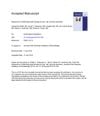 4 citations,
August 2018 in “Journal of The American Academy of Dermatology”
4 citations,
August 2018 in “Journal of The American Academy of Dermatology” The authors agree that biotin may help certain hair disorders but lacks evidence for use in healthy people and call for more research.
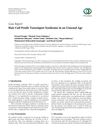 4 citations,
January 2015 in “Case reports in urology”
4 citations,
January 2015 in “Case reports in urology” An 8-year-old boy recovered from a rare case of penile tourniquet syndrome after hair removal surgery.
 4 citations,
April 2014 in “Journal of Pharmacology and Pharmacotherapeutics”
4 citations,
April 2014 in “Journal of Pharmacology and Pharmacotherapeutics” The boy's hair loss was caused by the tuberculosis drug isoniazid but grew back after stopping the medication.
 4 citations,
July 2012 in “Dermatologic Clinics”
4 citations,
July 2012 in “Dermatologic Clinics” New biopsy techniques and tools improve alopecia diagnosis, and both too much and too little selenium can cause hair loss.
 4 citations,
November 2009 in “Medical Clinics of North America”
4 citations,
November 2009 in “Medical Clinics of North America” Stress, nutritional issues, and chronic diseases can cause hair loss, and nail changes may signal internal diseases; treatment focuses on the underlying cause.
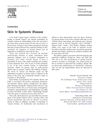 4 citations,
May 2008 in “Clinics in Dermatology”
4 citations,
May 2008 in “Clinics in Dermatology” Skin problems can indicate different diseases inside the body.
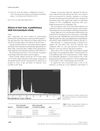 4 citations,
February 2007 in “Journal of the European Academy of Dermatology and Venereology”
4 citations,
February 2007 in “Journal of the European Academy of Dermatology and Venereology” The study suggests silicon might be important for healthy hair, as less silicon was found in people with hair loss.
 4 citations,
May 2002 in “Aesthetic Surgery Journal”
4 citations,
May 2002 in “Aesthetic Surgery Journal” A new hair loss classification for women improves treatment, but careful patient selection is crucial for successful hair transplantation.
 4 citations,
July 1996 in “Annals of Internal Medicine”
4 citations,
July 1996 in “Annals of Internal Medicine” High doses of fluconazole can cause reversible hair loss.
 4 citations,
August 1978 in “PubMed”
4 citations,
August 1978 in “PubMed” Many women's hair loss is due to health issues, medication, nutrition, or stress.
 4 citations,
June 1976 in “JAMA”
4 citations,
June 1976 in “JAMA” Severe calorie cutting can cause hair loss, but hair usually grows back after some time.
 3 citations,
June 2023 in “Medicines”
3 citations,
June 2023 in “Medicines” Some antiseizure medications can cause reversible hair loss, with valproate, lamotrigine, and carbamazepine being the most common.
 3 citations,
May 2023 in “Frontiers in Public Health”
3 citations,
May 2023 in “Frontiers in Public Health” Most severe COVID-19 patients in Mexico experienced long-lasting symptoms that worsened their quality of life.
3 citations,
April 2023 in “CRC Press eBooks” Hair loss can cause stress and needs different treatments based on its type.
 3 citations,
April 2023 in “Clinical and Experimental Medicine”
3 citations,
April 2023 in “Clinical and Experimental Medicine” The study identified five types of long COVID symptoms and suggests tailored management strategies for each.
 3 citations,
October 2022 in “International Journal of Dermatology”
3 citations,
October 2022 in “International Journal of Dermatology” COVID-19 can cause hair and nail disorders after infection.
 3 citations,
July 2022 in “The Journal of Dermatology”
3 citations,
July 2022 in “The Journal of Dermatology” COVID-19 infection can cause new hair loss conditions or worsen existing skin diseases, with hair loss being the most common issue.
 3 citations,
June 2022 in “Journal of The American Academy of Dermatology”
3 citations,
June 2022 in “Journal of The American Academy of Dermatology” During the COVID-19 pandemic, more people were diagnosed with stress-related skin conditions like acne and temporary hair loss.
 3 citations,
March 2022 in “Annals of Medicine”
3 citations,
March 2022 in “Annals of Medicine” Hair shedding after COVID-19 is more linked to the disease's severity and inflammation rather than hormones, with women at higher risk.
 3 citations,
January 2022 in “Einstein (São Paulo)”
3 citations,
January 2022 in “Einstein (São Paulo)” The pandemic increased stress-related skin conditions and those affected by behavior changes.
 3 citations,
January 2022 in “Cutis”
3 citations,
January 2022 in “Cutis” Telemedicine is effective for diagnosing hair loss, especially in people with darker skin, during the pandemic.
 3 citations,
January 2021 in “Skin appendage disorders”
3 citations,
January 2021 in “Skin appendage disorders” Trichoscopy is useful for correctly diagnosing tinea capitis in adults with unexplained hair loss.
 3 citations,
October 2020 in “Plastic and Aesthetic Nursing”
3 citations,
October 2020 in “Plastic and Aesthetic Nursing” The document concludes that available medical treatments for common hair loss disorders are generally safe and effective, and the emotional impact of hair loss should be considered in treatment plans.
3 citations,
October 2019 in “CRC Press eBooks” Isotretinoin effectively treats severe acne but can cause significant side effects like dry skin and hair loss.
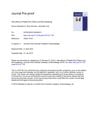 3 citations,
August 2019 in “Journal of The American Academy of Dermatology”
3 citations,
August 2019 in “Journal of The American Academy of Dermatology” PRP with microneedling is generally safe but can cause minor side effects like scalp itching, temporary hair shedding, and swollen lymph nodes.
 3 citations,
April 2019 in “Journal of Dermatological Treatment”
3 citations,
April 2019 in “Journal of Dermatological Treatment” Caffeine shows promise for treating some types of hair loss, but more research is needed.
 3 citations,
January 2019 in “Skin Research and Technology”
3 citations,
January 2019 in “Skin Research and Technology” Frequent use of hair straighteners can cause hair loss similar to scarring alopecia in young Turkish women.
 3 citations,
January 2017 in “Journal of Pakistan Association of Dermatology”
3 citations,
January 2017 in “Journal of Pakistan Association of Dermatology” Women with certain types of hair loss may have low iron levels, and iron supplements could help.
 3 citations,
January 2017 in “Journal of cosmetology & trichology”
3 citations,
January 2017 in “Journal of cosmetology & trichology” The food supplement with L-cystine, Serenoa repens extract, and biotin safely reduced hair loss and improved hair growth in men and women.
 3 citations,
November 2016 in “Clinical Pediatrics”
3 citations,
November 2016 in “Clinical Pediatrics” A girl with Crohn's disease developed hair loss from her medication, which improved with treatment but later returned.




























